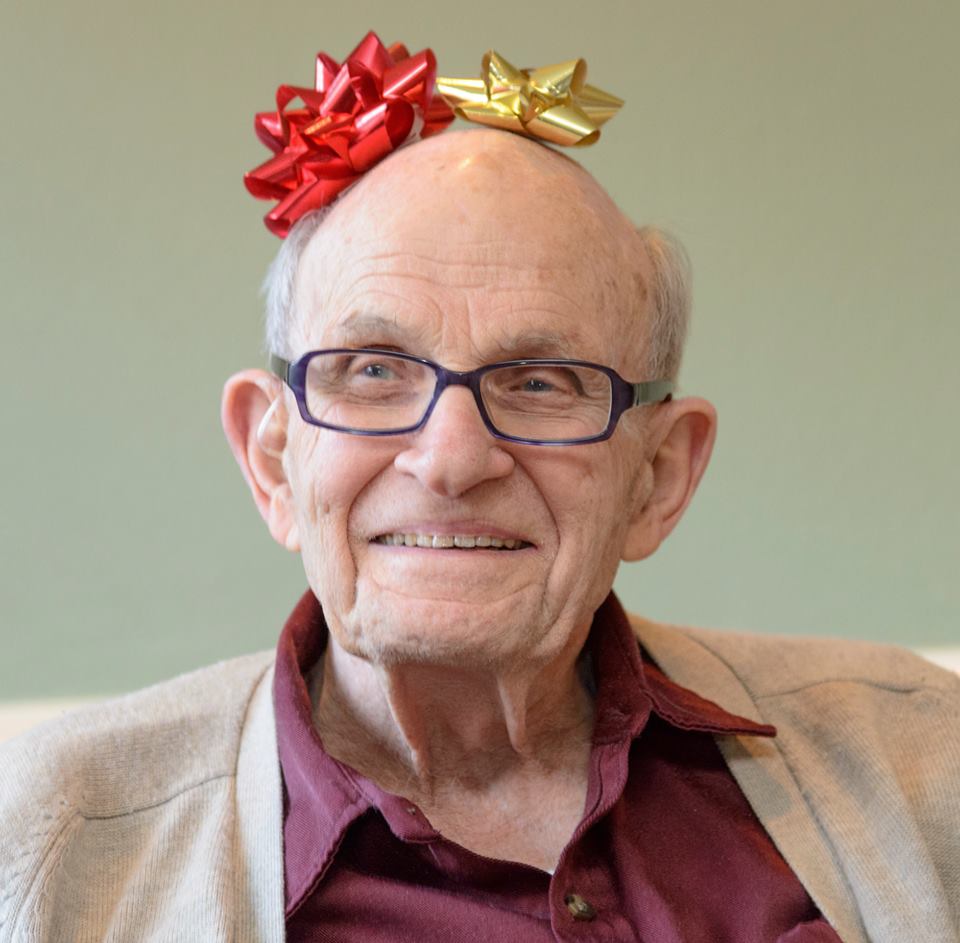An Interview with My Great Uncle, Larry Freedman
Recently, I had the distinct pleasure of interviewing my great uncle Larry, who is my late Grandpa Art’s younger brother. At 91 years young, he and I are 60 years apart in age.
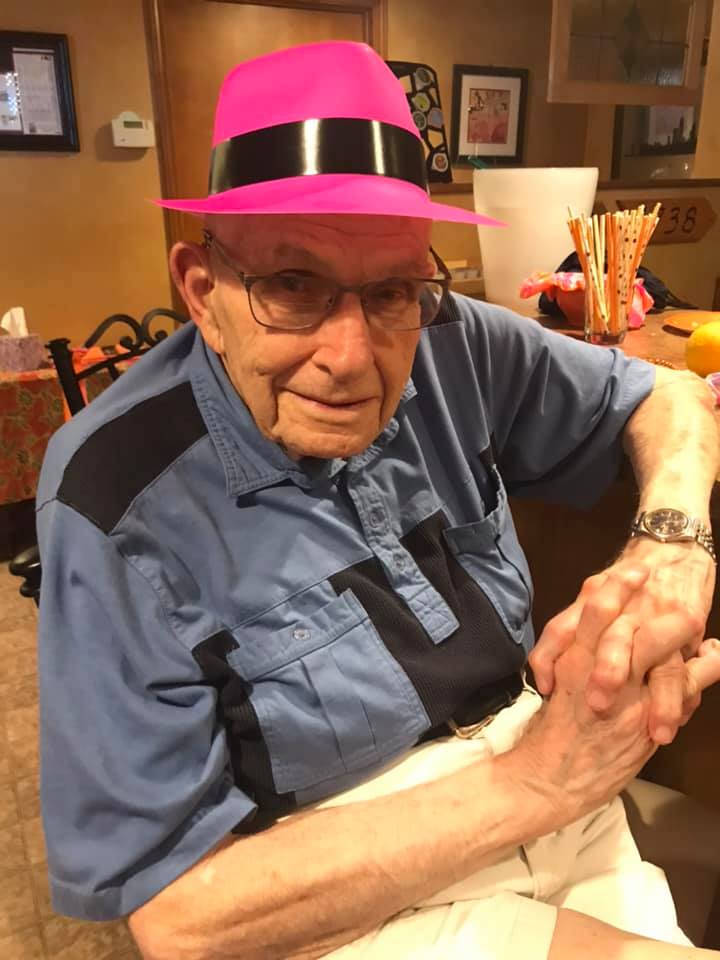
The biggest takeaways from our conversation are slightly different than those from my other family interviews. Larry is a genuinely humble man – possibly the most humble person I know. So his story is less about goals and achievements, but rather about the little things. About being present. About appreciation.
Don’t get me wrong – Larry has plenty of accomplishments to brag about, but that is not his way. So I will do my best to get the tone right, just as it sounded when I heard it from him.
I think a good way to start is to begin with how some of our exchanges end. When Larry emails me he closes each message by signing, “Larry the Uncle”. And of course, to me, that’s what he is. But through our conversations, I learned more than ever about Larry the Boy, Larry the Musician, Larry the Soldier, Larry the Boy Scout, and Larry the Family Man.
And as is the case with anyone who embodies true humility, there is a lot more to Larry than meets the eye.
Larry the Boy
Larry was born in Brooklyn, NY in 1928, just before the stock market crash of 1929. His parents met at a swimming pool in New York, got married and had two boys. His mother was a fashion artist who drew primarily for the Lord & Taylor department store and who continued working part time after having kids. At that time, his father was a successful insurance broker, real estate investor and property manager.
When Larry was only two years old, his parents decided to move the family to the Westchester County suburbs in order to take advantage of a better school system for the children. They rented a house, but because of the Great Depression, Larry’s Dad lost much of the property in which he and others had invested or managed, resulting in a substantial reduction in income. Larry’s mom found it impossible to work even part-time. Of course, Larry didn’t realize the gravity of the struggles they were facing until much later, and he didn’t mind living in several different apartments or going without a family car. Childhood felt normal. One of his fondest memories was the frequent bus rides with his brother to a public beach and swimming pool.
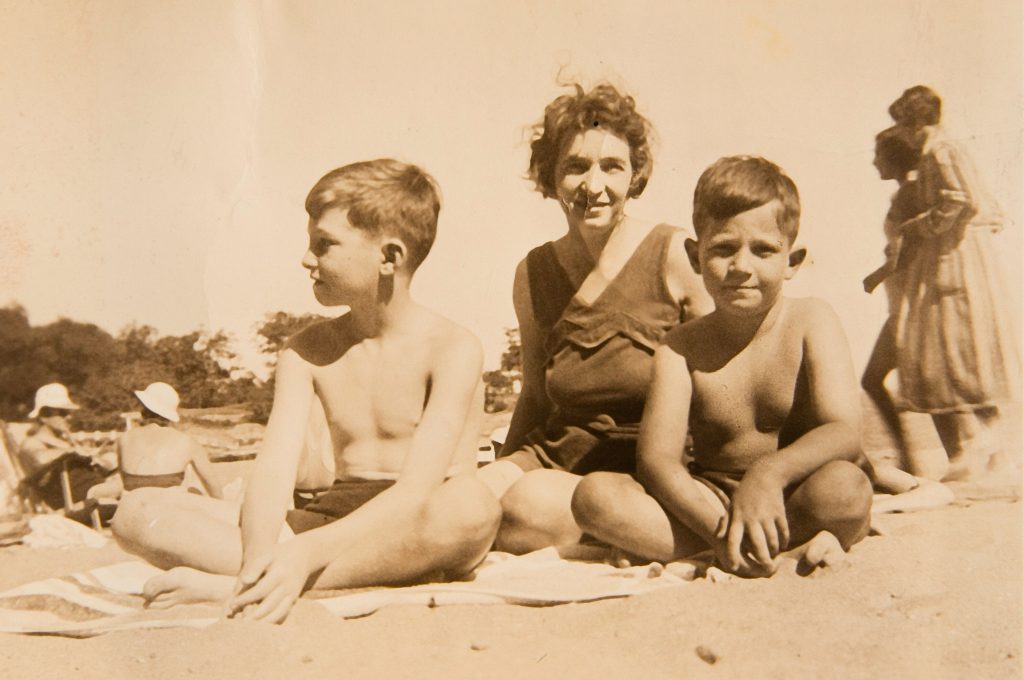
Larry’s fraternal grandparents were Jewish, Russian immigrants – a part of my lineage I have always wanted to learn more about. Larry’s mother was raised as a Lutheran, her mother having been a Swedish immigrant. Although Larry was told he was Jewish, his parents were not religious, and he had no religious training growing up. The family did not join the local temple because of the financial commitment required.
Nevertheless, Larry identified himself as Jewish culturally. He appreciated being able to stay home from school on important Jewish holidays. His father was one of ten kids, so Larry enjoyed attending bar mitzvahs for his cousins, even without understanding a word of Hebrew. He remembers fondly the family gatherings at his Grandmother’s house in Brooklyn for dinner on Passover. Being part of a Jewish family continued to be an important factor in Larry’s life, but his religious views adapted and changed just as he did with age.
I asked Larry what life lessons he learned from his parents. He explained that they helped him understand the importance of relationships, kindness, and goodness. Even though they were poor, his father was still contributing to charities and was sorry he couldn’t do more. It made him angry to see homeless people; he just had a passion for others. The love and respect Larry’s mother and father showed to all their relatives greatly influenced Larry’s attitudes later in life about family relationships, and he is especially grateful for how much his parents sacrificed for the welfare of their two sons.
Perhaps an even greater influence was his older brother, Art. They had so much in common because, as Larry put it, his brother was his hero. He wanted to follow in his steps in school, hobbies, and life in general, and he did so for their entire childhood. According to Larry, “If he did it, I wanted to do it…but I never did it quite as well”. He followed Art by becoming the high school band drum major, playing french horn, singing, becoming an Eagle Scout, and he was even salutatorian for their high school (although Art was valedictorian).
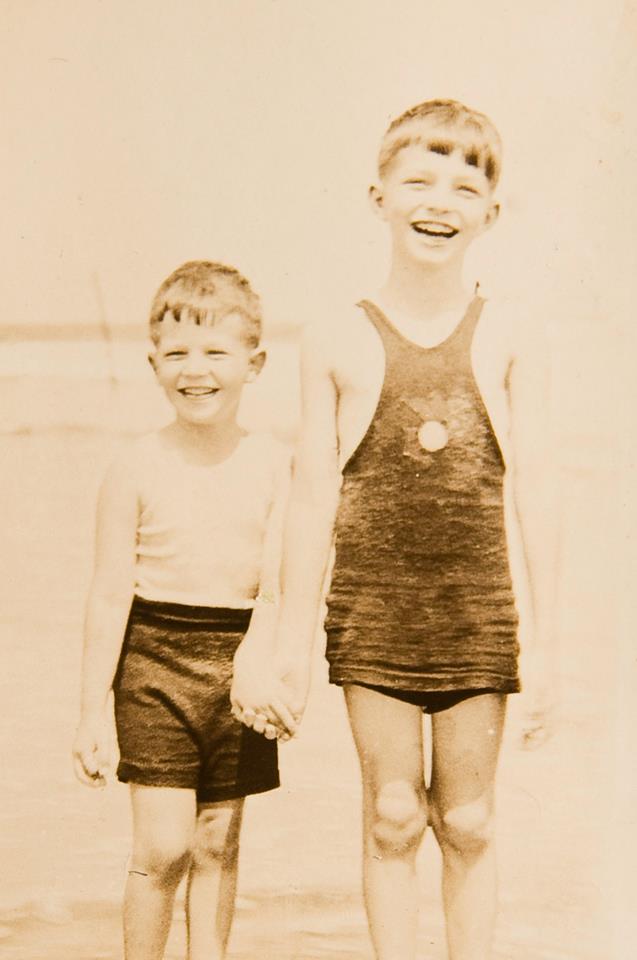
Like so many boys in the New York area, where there were three professional teams, Larry grew up loving baseball. Since Larry played first base for his fifth grade team, his goal was wanting to succeed the great Lou Gehrig at first base for the New York Yankees. He recalled the first time he ever saw a professional baseball game: his father took him to a special double header at Yankee Stadium when Gehrig was honored for having played in the most consecutive games ever (over 2000). Since TV had not yet been invented, this was a truly momentous experience.
Although Larry always remained an enthusiastic sports fan, supporting most local professional and college teams, he soon learned that he could not hit a curve ball or a fastball, and rarely could he hit a slow ball. Instead, he immersed himself into a different hobby, which would eventually become a lifelong passion.
Larry the Musician
Both Larry and his brother were musically inclined; they loved to sing and play instruments. Like his brother, Larry learned to play the french horn and joined the high school band and orchestra. He also sang in the glee club and choir, and took piano lessons. Larry was thrilled when his piano teacher took him to Carnegie Hall for a Saturday matinee concert by the Boston Symphony 0rchestra. One of his most memorable high school experiences was a bus trip to the original Metropolitan Opera house in New York for a performance of Carmen, resulting in his life long love for opera.

When Larry was deciding where to go to college, he applied to New York University, just like his big brother did. His plan was to enroll and play french horn, but as it turned out the NYU admissions director was also the band director. He asked straightforwardly, “Can you play baritone horn?”, to which Larry replied, “I never have, but I am sure I could learn”. This quick conversation earned him a scholarship which allowed him to be able to afford NYU. He found that band members did not have to take the required R.O.T.C (Reserved Officer Training Corps) training, since the band played for the weekly parades and also the NYU football games.
Although Larry had to commute several days a week to the NYU Bronx campus, he found time to participate in college activities. He joined the renowned NYU Varsity Men’s Glee Club that performed annually at the Town Hall concert hall in Manhattan. Many of his fondest college memories occurred as a member of Alpha Phi Omega, a service fraternity that required you to have been a boy scout.
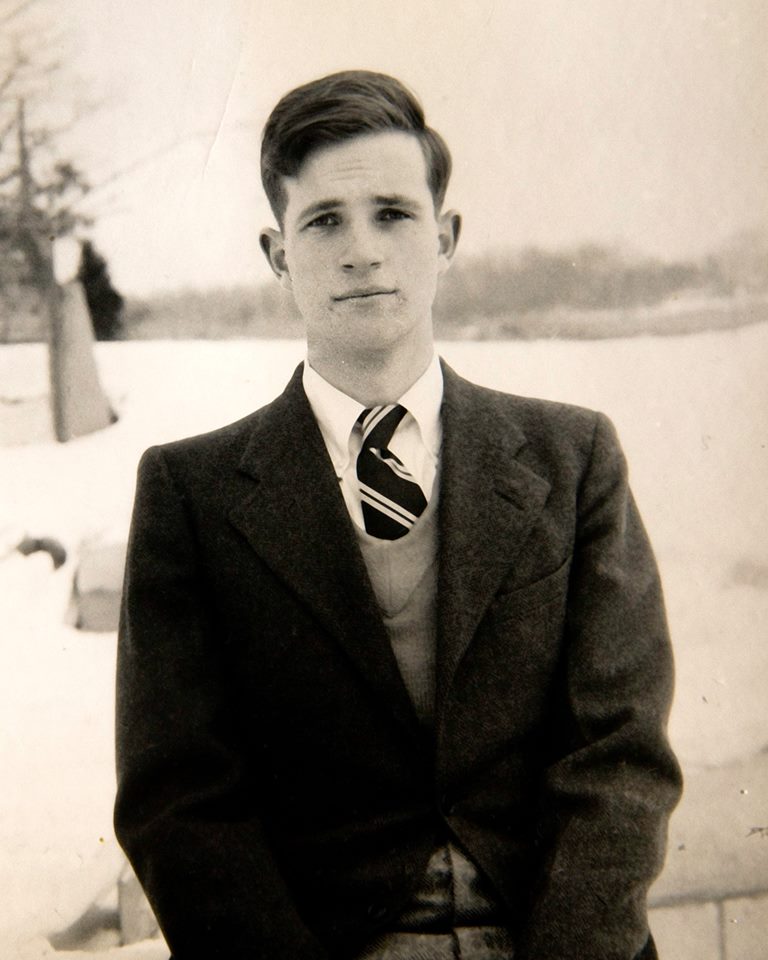
In college, Larry did not have a clear career goal, unlike so many of his Jewish classmates who were planning to become doctors. He was not enthused about the pre-med requirements for biology and comparative anatomy, so ultimately he decided that a major in economics suited him best. He graduated in 1949 and wondered what in the world to do next.
But suddenly, like so many other young men at that time who escaped military service during World War II while attending college, he was soon drafted for the Korean War. According to Larry, “That solved that problem”.
Larry the Soldier
According to Larry, he expected the draft to find him because so many of his friends had already been drafted. His brother was not eligible due to a speech impediment; he unfortunately discovered the one thing he could do that Art could not. He simultaneously referred to being drafted as a “nice change of pace” and “traumatic”. Soon, he found himself travelling to Massachusetts for induction into the Army infantry. He was moving forward, but following in no one’s footsteps.
Larry recalled taking the never-ending train ride to join the California 40th Infantry National Guard division that was being filled with new draftees. He traveled across the entire length of the only country he knew, curious about what war would be like in Korea. After a few months of basic training, he remembers the division commander general assembling the entire division and announcing that they were going overseas where he was told “some of you will die on the field of glory”. But first, he had 9 more months of training to do, this time in Japan while waiting for orders to relieve a regular army division in Korea.
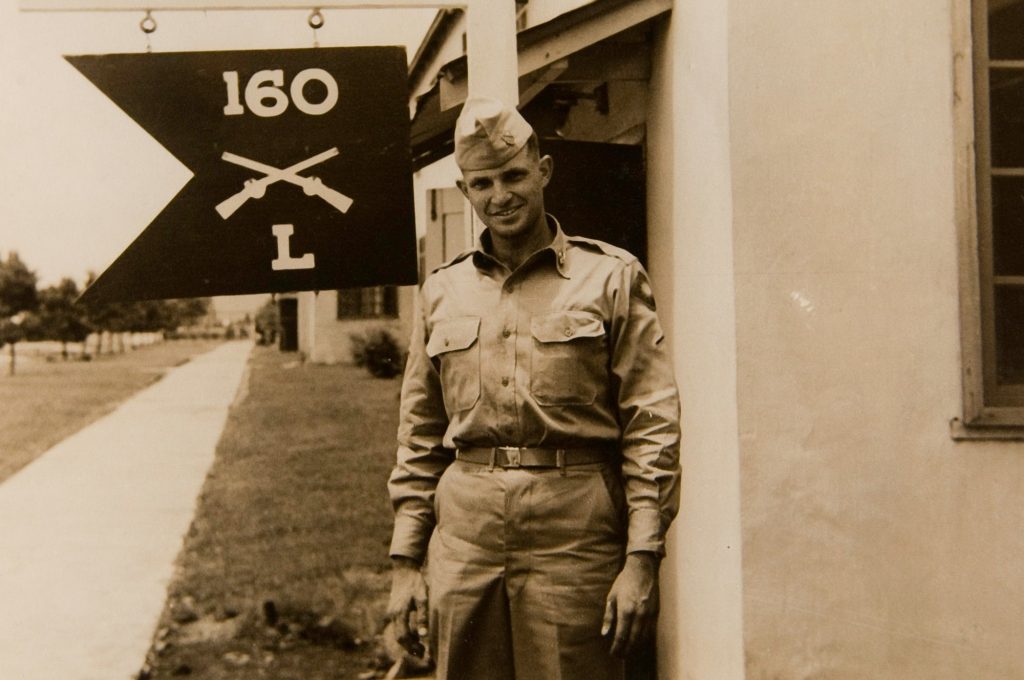
Like half of the men around him, sea sickness was awful travelling from California to Japan on a navy troop ship. But all that aside, he felt somewhat in his comfort zone; the Boy Scouts as well as basic training in California had helped prepare him for army life. He knew how to get up early, live outdoors, do chores, salute, march, and even carry a rifle. But like it was for every draftee, war would be uncharted territory.
Eventually he found himself digging a fox hole on the beach at Yokohama, where the proposed World War II invasion plans of Japan were being reenacted. It was a Sunday afternoon, and the Japanese civilians were cheering for their endeavors, while at the same time some of the soldiers crawled in the sand to purchase ice cream from various vendors nearby.
Overall, life in Japan was pretty good, other than when a fire destroyed their barracks and when a cyclone damaged their tent city at the foot of Mt. Fuji. One particularly fond memory was one weekend when Larry and two of his buddies climbed to the top of Mt. Fuji, sleeping in a shelter overnight on a straw mat.
One of his experiences was to attend bayonet training, which they referred to as “killer school”. After his first lesson, startled by what he just learned, he took a walk back to his barracks. Suddenly he heard band music – a familiar Sousa march to be specific. He found the tent it was coming from and noticed a baritone horn sitting on a chair with no one playing it. Without missing a beat, he picked up the instrument and began playing along to the music he had played so many times in his high school and college marching bands. After the piece ended, the regimental commander walked up to him and said, “You are no longer in killer school. I want you here every morning for band rehearsal and every evening when we play for retreat”. Larry remembers this moment as “simply wonderful”.
But time in Japan was coming to an end. He had survived natural disasters like cyclones and fires, but wondered if they were ready for a man-made disaster such as war.
He arrived in Korea where armistice talks had started, and his unit was stationed on one side of a valley, with the Chinese army opposite. It was winter, and their bunkers were cold. For quite some time, action was minimal; the most danger he faced was once on night patrol when he tripped and fell on his own bayonet, cutting his face. While laughing, he told me how he thankfully never had to kill anyone else with his bayonet, but he did almost kill himself with it.
There was not a lot of opportunity to use their rifles either, other than shooting at deer in the valley – which the Chinese were also shooting at. But soon a new colonel took over the regiment who quickly decided that they were too inactive. One night he ordered everyone to advance into the valley. The soldiers tried to take cover in the woods, but were quickly discovered by the Chinese who bombarded them with artillery right and left. They retreated, and luckily for my family, Larry was unharmed.
After 6 more months and periodic action, he finally got the news: his army time was up. He was sent home on one more ship, travelling to Seattle, where he then took another train across the country to New Jersey where he was discharged. He remembers being so happy to be home, to see his family, and to see his dog.
Life for Larry the Soldier was over, allowing him to revisit one of his greatest passions as a boy.
Larry the Boy Scout
Throughout his youth, Larry rose up through the ranks of the Boy Scouts and eventually became an Eagle Scout, solidifying his love of the outdoors. While serving in the army, Larry learned from an officer who was a professional scout executive in civilian life that scouting could even be a career, so this was fresh on his mind when he was discharged.
To get back on his feet, he started working for his father in his insurance business, but he made sure to volunteer for the Boy Scouts regularly, taking youth on camping trips and working at summer camps.
After considerable experience as a volunteer scout, he decided professional scouting might be the career he would enjoy. After a three week training program, he was placed as an assistant district executive in Nassau County, Long Island, the fastest growing Boy Scout council in the country. The post war youth population was growing so large that the two employees had difficulty keeping up with the demand for new cub packs and scout troops. They worked tirelessly to recruit and train the volunteers needed to lead the new units and to participate in the frequent finance campaigns. For part of each summer, Larry served on the staff of the council’s large scout camp, and he always found time to lead songs in the mess hall.
After a brief engagement to a Jewish girl in the Bronx ended, Larry felt sorry for himself and thought it might be fun to visit the Tanglewood Music Festival in Lenox, Massachusetts, the summer home of the Boston Symphony. When looking for somewhere to stay on a July 4th weekend, he saw an ad in the newspaper for an inn. It read that they offered “lox and bagel evening snacks” which was code for “Jewish clientele are welcome”.
He remembers driving up and meeting the young lady who worked at the front desk. He learned her name was Mariyln, and they chatted briefly. Also serving as the concierge, she offered to help him get tickets for festival concerts and other musical and theater performances in the area, and she also told him where his seat would be in the dining room. Before leaving, he said, “I noticed there is a lake down below…”, to which she smiled and said, “Sure, I’ll take you there”.
They chatted by the lake for a while, and at one point she playfully took off his hat, which revealed he was already partially bald. They laughed together, but he wasn’t sure if she was as interested as he was.
Later that night, he went to his assigned seat at dinner to find himself at a table with several middle-aged Jewish women, all of whom were very excited to have a young man in their company. But quickly the friendly mood of his tablemates changed when Marilyn entered the room, and walked straight toward Larry. She had put his seat right next to hers.
They chatted for a long time that night, and Larry learned that Marilyn was the director of a school for practical nursing in Harlem and that the owners of the inn were friends who offered her the summer job. Marilyn obtained two tickets for Tanglewood and other attractions, always sitting next to each other. In fact, they would continue to sit next to each other for the rest of her life.
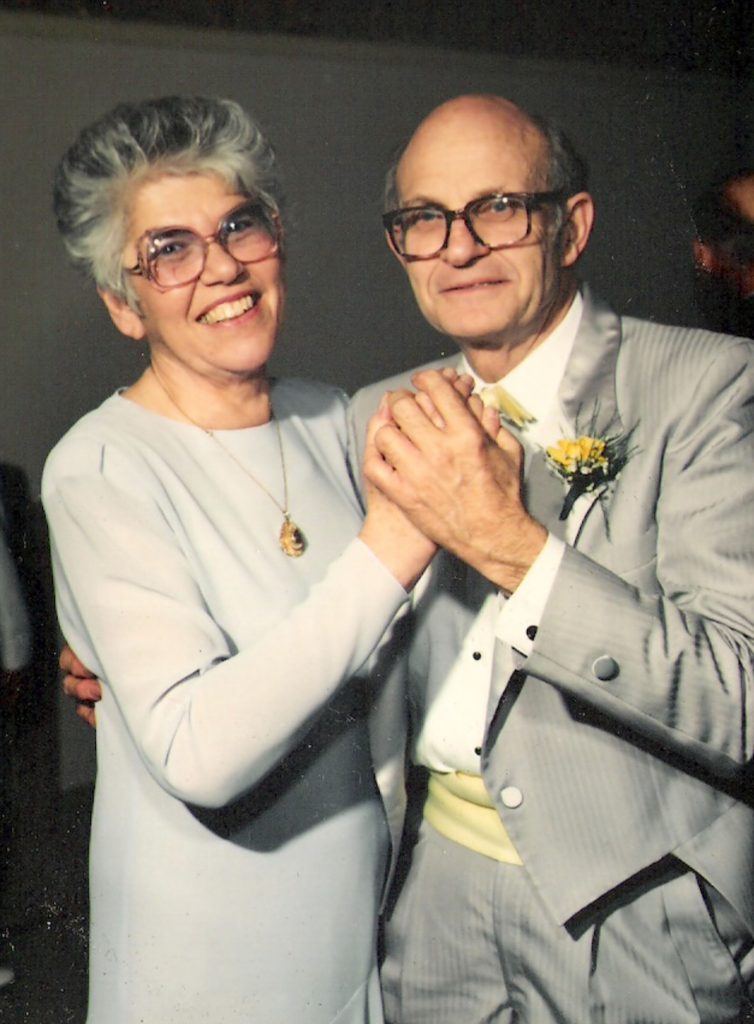
He was quickly becoming Larry the Family Man.
Larry the Family Man
Larry told me about the Manhattan E 78th street brownstone apartment where Marilyn lived. It was on the 3rd floor, and he remembers the long walks up to see her, and he always had to take the garbage down when leaving. When they talked about marriage she said she wanted to get married in the Ethical Culture Society in New York; she was raised Jewish as well, but she found Ethical Culture more open.
The emphasis of Ethical Culture is on what you do today, rather than what you believe, their motto being “Deed, Not Creed”. Larry and Marilyn would both become very involved in this movement and later as members of the Unitarian Church, which has a similar liberal and open religious philosophy. Larry credits his involvement with these institutions in greatly helping him become a better person.
The way Larry described their wedding made it sound simple and perfect. It was December 21st, a Saturday, surrounded by a few family and friends. Nothing big or fancy. They went out to lunch at Tavern on the Green in Central Park and then drove to Williamsburg, VA for their honeymoon. He remembers hearing nothing but annoying Christmas music on the radio during their drive.
After they were married, Larry’s career in the Boy Scouts was going well, but the hope of starting a family and buying a home meant that it was time to look for a more lucrative opportunity. He was advised by a professional career counselor that his scouting experience in recruiting, training and managing volunteers and in organizing finance campaigns would be valuable in the areas of marketing and sales management. This was confirmed through some aptitude testing, and as a result, he largely focused on sales and marketing during his long career, working for a variety of companies in multiple cities. One company in particular allowed him to earn his MBA, which was critical in moving his career forward in sales, market research and management, as well as applications of computers in business.
After experience as a market analyst with two established publishers of legal material, Larry became involved with several new companies who were pioneers in the fields of automated legal research and record keeping, especially in the areas of worldwide trademark and patent law. Most recently, Larry was a marketing manager for a startup company in the field of manufacturing shop floor control software.
Looking back, he realized what he really enjoyed was working with a brand new firm and helping it get off the ground; in fact, he did this several times. As Larry put it, “perhaps it just happened that way, or perhaps I did it on purpose. But I found it very satisfying to help others succeed”.
After the discussion of his winding career path, he was very clear to me that throughout his professional life, he always had family at the forefront of his mind. He and Marilyn raised three kids in total, and he often described how much he loved it.
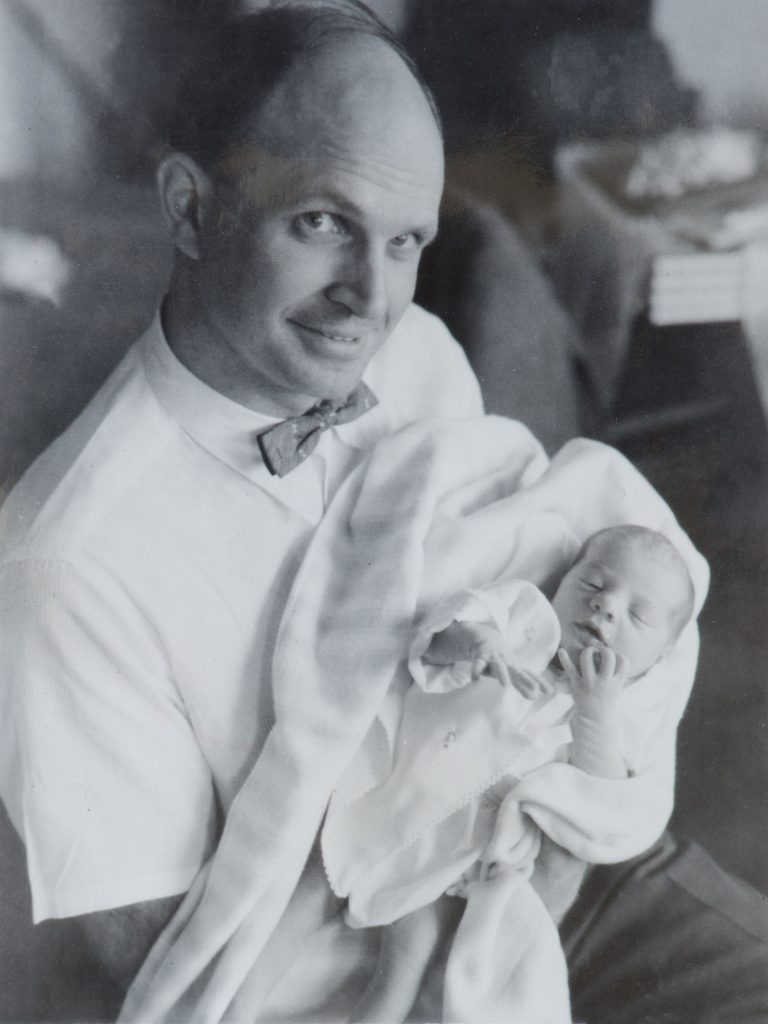
As his family grew, sometimes in unexpected ways, he always treasured gaining a new niece, nephew, or grandchild. When his brother announced his second marriage, he was thrilled to gain one more sister-in-law, as well as her three daughters. He thought, the bigger our family, the better. When their eldest daughter married a man who had been married previously, Larry and Marilyn became pleasantly involved with a whole new circle of his children and relatives.
Perhaps most poignantly, Larry and Marilyn had 51 years together in a loving marriage, and Larry feels that serving Marilyn as her principal caregiver during the last few years of her life was one of his most gratifying life experiences he could ever have.
Larry the Uncle
Like any good uncle, when you are talking to Larry, he makes you feel truly heard. It feels like it’s just the two of you, even though in reality you are at a giant, crowded, family party. My Grandpa was like that, too. I’ve decided that it comes from a lifetime of knowing how to be fully present; a skill that is all too rare these days.
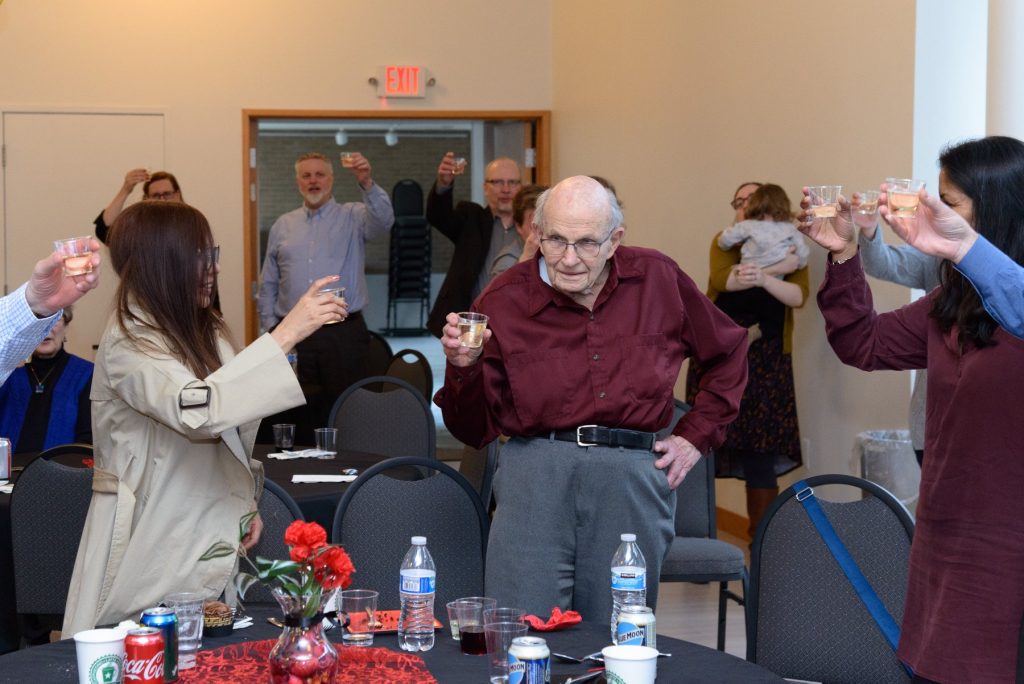
The last question I asked during our chat went something like this:
“Uncle Larry, you are 91, and I am 31. In the 60 years you have on me, what do you now know that you wish you could tell yourself at 31?”
He said that at 31 you have just enough experience to know what you like, what you don’t like, and what is really important to you. You spend too much time at work for it to be something you aren’t really passionate about. If you like dance, open a dance studio. If you like sports, get into sports management. Find your passion, and go for it. Otherwise, life will be pretty boring.
Boy, does that resonate. Every 30-something year old I know, myself included, is wondering what is next. We are all trying to make a jump into having more responsibility, making more money, or just finding what makes us truly happy. It feels good to have the permission to just go for it.
Larry then told me he is starting to slow down. Although he no longer sings in his church choir and has retired as an active volunteer, many of his best friends are church members and he is still part of their Humanist group. Listening to opera and other music is still a passion. He does not take long trips anymore – but over the last few years he has gone on three cruises, and travelled to places like Europe, the Rockies, and Yosemite (and he rarely, if ever, misses a family party). And he doesn’t drive anymore – but he still makes it to bridge clubs two days each week.
I think he and I have different definitions of “slowing down”.
When I asked about future goals he has, he said he doesn’t want to worry about goals anymore; he wants to stay healthy, get his affairs in order, and enjoy his time. After all, us Freedmans are nothing if not practical.
But the thing is, I am not sure Larry was ever worried about goals. Perhaps the greatest thing I learned from our conversation is to keep it simple. Find the people and things you enjoy, and put them in your life as much as possible. Period.
If I do that, maybe in 60 years I’ll be telling my future great niece less about my formal accomplishments and more about walking to Dairy Queen for a vanilla cone dipped in crunch topping every summer, or the way it feels to run down the soccer field on a breakaway, or how I squeezed Nick’s hand too hard on a haunted hay ride during one of our first dates…and that he didn’t tell me how much it hurt until later so I wouldn’t feel bad.
To close, I want to tell Uncle Larry thank you for the lessons, and for the lessons to come. Needless to say, there are more stories I hope to hear and more questions I plan to ask.
So get ready Uncle Larry – at the next family party there may be several of us waiting in line to learn from the best all-around man we have!
